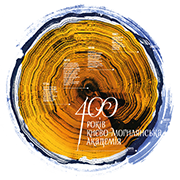News
Modern European, not marginal post-Soviet universities needed
- Details
- Published on Monday, 15 April 2013 11:46
New article by NaUKMA President Serhiy Kvit published at University World News
Let’s sketch out the main characteristics of a post-Soviet university, based on the latest experience in Ukraine. I’ll take the liberty of supposing that those characteristics are universal, although the situation in Ukraine probably reflects the worst of all the post-Soviet systems.
Compared to some of the achievements attained by universities in Russia, Belorussia or Kazakhstan, possibly a result of government patronage or control, Ukraine cannot demonstrate any benefits that have come its way in connection with post-Soviet changes to its higher education system since 1991.
Ukrainians probably take the idea of freedom, including freedom of speech and political rights, too seriously, which makes it difficult for them to accept an authoritarian model.
Also, the government doesn’t have any extra resources to invest in science and education so that Ukraine can follow the so-called ‘Russian model’, with its emphasis on overall governmental control.
In all the former Soviet republics apart from the Baltics, the legacy of the Soviet days remains. They have similar rules still in force, have structurally similar higher education institutions and a similar research infrastructure, and post-Soviet patriotism and corruption are common.
A post-Soviet university
Post-Soviet universities are unique because the circumstances enabling their existence are unique.
First, state politics do not pay any attention to universities. Higher Education institutions do not really have any value for the Ukrainian state, since politics is just about retaining power, not about developing society. That is why the state is ineffective.
Universities are not considered necessary for generating quality human capital or for producing new knowledge. The state machine is mostly used for personal enrichment; therefore political elites are imbued with a short-term view. Long-term planning cannot even be mentioned. We have not even defined what our long-term aims are.
Second, phrases like ‘European integration’, ‘the Bologna process’ and ‘the society of knowledge’ are just utopian ideas in present-day Ukraine.
Whenever the academic community argues about education standards based on European and global experience, government officials laugh. They say such standards are unnecessary or even harmful.
Third, hostility against Bologna standards is rooted in a sense of pride for the ‘glorious’ Soviet legacy, and our intention to find ‘our own way’ in contemporary higher education, following the example of those who are ‘closer’ to us.
That means Russia and its post-Soviet satellites, so English must be rejected in favour of Russian, Ukraine’s history must be reconsidered and so on.
The minister of education and science makes xenophobic declarations about Ukrainian culture and ridicules the achievements of the American education system. His main goal is to integrate Ukraine into a resurrected Russian empire, not to improve the quality of universities.
Fourth, rectors are not members of their university communities. This is not because they are administrators in universities, but because they totally depend on those in power – mainly on the Ministry of Education and Science. Therefore, rectors do not consider their main task to be raising academic quality, but holding onto their jobs.
Some Ukrainian rectors have been in position since the Soviet period, and this is not thought to be extraordinary. Their idea of success is not based on their universities’ development, but on their own survival. Rectors are therefore easily manipulated; they totally depend on the authorities and will call ‘white’ ‘black’ if they are told by the government to do so.
Fifth, the minister of education and science, and indeed governmental officials at all levels, can hire and fire rectors, put financial pressure on universities, make various inspection visits that paralyse university activities, take away university property, blackmail institutions and misinform the public.
Sixth, rectors and the academic community do not come together to promote their rights and protect national interest by improving the quality of science and education. Student movements are somewhat more effective. Nevertheless, academics in Ukraine are not involved in any public activity.
Education institutions that are called universities are not real universities. They are far from achieving their professed visions or carrying out their missions, and cannot even properly define them.
Finally, the ruling party considers higher education from the perspective of the ‘power hierarchy’. The president holds power over the education minister, the minister holds power over rectors, and they in turn are the absolute powers in their institutions.
Universities are falling hostage to rectors. This is a ‘Russian model’ of governance, which presupposes that only one person at the very top of the power pyramid can decide what the whole country does.
A Ukrainian university
It is hard to distinguish our Soviet or Russian colonialist heritage from what we’d like to consider as our original Ukrainian traditions. Therefore, I will take the liberty of sketching out some features that could form part of today’s Ukrainian university.
They are all based on a discourse of freedom, openness to the global world and progressive change. One of those changes is the urgent implementation of university autonomy and academic freedom. The university is a free forum for discussing new ideas and concepts.
The Ukrainian university also plays a role in the social structure by disseminating new ideas and fostering a proactive attitude and critical reasoning skills in students as young citizens.
Besides meeting high academic and professional standards and being global-facing, it is essential for the Ukrainian university to indeed be a Ukrainian university. From this perspective it should play the role the nation needs it to play, which is one where Ukraine keeps up with modern European standards and not marginal post-Soviet ones.
